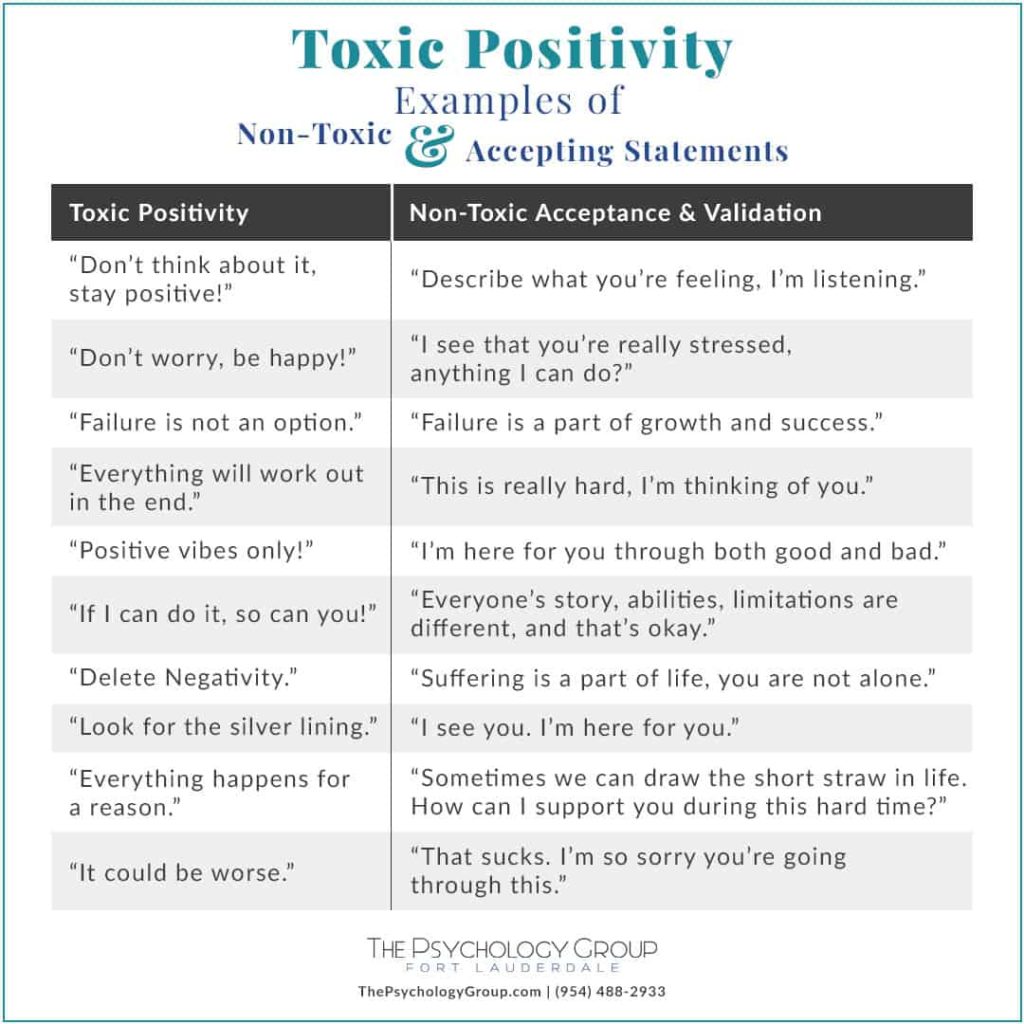
Toxic positivity is a concept that has taken on significant meaning
during this current health crisis.
Things are tough out there. We are unable to hug our besties or family — or even visit them. School openings are chaotic. Unemployment is at a record high, which means people are losing insurance as we navigate the worst public health crisis in a century. Everyone I know has been affected by this crisis, however, some have been more heavily impacted than others. This has collectively affected our mental health.
Essentially, toxic positivity is the construct that an individual’s concerns, fears, sadness are brushed aside in favor of an “only positive vibes” mentality. Sometimes we bring that upon ourselves by burying our concerns and ignoring our feelings. Other times, people inform us that we should merely look at the bright side — all the time.
Burying our feelings is exhausting and only creates more stress.

What About Positive Vibes?
Sure, positive thinking definitely changes the way our brain frames circumstances in our lives. There are plenty of situations in which positive thinking makes a difference in our outlook and performance. Often these situations are temporary and can benefit from a quick mental script change. (And sometimes we must repeatedly change the script running through our minds!) Gratitude journaling has shown to help induce positive vibes.
People are experiencing joy, fun, and wonderment, despite the many crises affecting our globe right now. People have found ways to spend virtual time with loved ones. The summer weather has allowed many to enjoy outside activities using the recommended distancing precautions. We are learning about ourselves, such as our resilience, resourcefulness, and appreciation for the simple things in life. It is okay to take a mental break from the incessant “noise” of media by walking, running, biking, talking with friends, etc. to help clear our minds.
People who feel anxious during this time also feel joy. Humans are pretty cool that way — we can feel lots of things at once.
Think only happy thoughts
However, our current situation has no end in sight. It is exhausting, scary, and confusing. This is new territory.
When a person is told to “focus on the positive”, “this too shall pass”, “let’s only talk about happy things”, and “you’ll be fine”, as explained in the article What is Toxic Positivity: Why it’s OK not to be OK right now by Brittany Wong, the underlying message being communicated is that your feelings don’t matter. It causes people to pull away and stop sharing. Individuals begin to internalize a narrative that says, “my feelings don’t matter” and may begin to feel ashamed.

What does this mean for parents?
Now think about this concept as a parent. If your child came to you and said, “I feel scared, Mom.” Which of the following is an appropriate response?
1. “You’re fine. Don’t be ridiculous. You have nothing to worry about.”
2. “Just think happy thoughts and your sad thoughts will go away.”
3. “What’s on your mind, Sweetheart?”
Well, let’s pick this apart.
Number 1 isn’t the best answer because, well, duh. You are dismissing your child’s feelings. You are communicating that their emotions are irrelevant to you. Down the road, this will translate to a lack of empathy towards others — and themselves. They are learning from you and your responses!
Number 2 is a terrific example of toxic positivity. The message is that their fears and concerns can be mitigated merely by thinking happy thoughts. Sure, that can work temporarily, but until the negative emotions are talked through, the unresolved emotions will bubble to the surface again. Talk it out!
Number 3 is an example of talking it out. Help young people explore their confusing, conflicting emotions. By doing so, you give them tools that will help them suss through their emotions, a skill that helps them develop into emotionally thriving adults. They learn that by talking through feelings with trusted humans, by allowing others into their hearts and minds, healthy relationships will blossom. They are learning resilience and empathy. Empathic people allow individuals to share their feelings without undermining emotions or brushing aside concerns with demoralizing comments. These are fundamental in learning effective communication skills to build healthy relationships.
Check out this helpful chart by The Psychology Group of Fort Lauderdale.

It’s not easy being an adult
2020 has graciously bestowed a cacaphony of mental noise upon us. If we find it difficult to cope, how can we expect our young people to understand how to navigate their feelings?
Importantly, it is okay to share with your kids that you don’t have all the answers either, that you are learning how to cope with the issues facing our communities, too. You don’t have to know everything, especially during these extraordinary circumstances.
To dig a little deeper into this topic check out the following resources:
Toxic Positivity: Don’t Always Look on the Bright Side by Konstantin Lukin.
Toxic Positivity: The Dark Side of Positive Thinking by Samara Quintero and Jamie Long (Check out their embedded video as well.)
What is Toxic Positivity: Why It’s OK to Not Be OK Right Now by Brittany Wong
Toxic Positivity is Real and It’s a Big Problem During the Pandemic by Healthline.com

